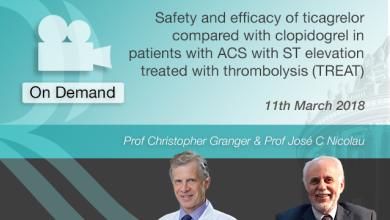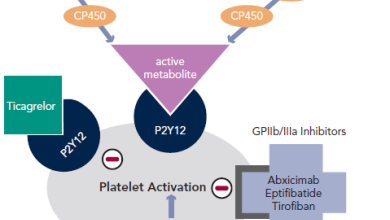Search results
Author(s):
Jean-Philippe Collet
Added:
3 years ago
The role of platelets in coronary artery thrombosis is well-established.1 They also play a critical role in a number of cardiovascular conditions including stroke, peripheral vascular disease and diabetes, and may be involved in the pathology underlying atherosclerotic changes.1 Antiplatelet agents such as clopidogrel, a platelet P2Y12 receptor antagonist, and aspirin are used for the prevention…
View more
Author(s):
Jean-Philippe Collet
,
Jochem Wouter van Werkum
Added:
3 years ago
Antiplatelet therapy is the standard of care for patients with acute coronary syndromes (ACS) and/or patients undergoing percutaneous coronary intervention (PCI) with stenting.1–3 Plaque rupture and/or iatrogenic vascular damage during PCI would normally result in the development of intravascular thrombus. Findings across multiple investigations consistently demonstrate the effectiveness of dual…
View more
Author(s):
Gregg Stone
,
Jeffrey W Moses
Added:
3 years ago
Safety and Efficacy of Sirolimus- and Paclitaxel-eluting Coronary Stents
Stone GW, Moses JW, et al.
N Engl J Med, 2007;356:998–1008.
Following reports of increased stent thrombosis and myocardial infarction, the safety of drug-eluting stents (DES) has recently been questioned. Researchers performed pool analysis of data from four double-blind trials in which 1,748 patients were randomly…
View more
Prof José C Nicolau
Job title: Professor Nicolau’s main area of research includes the broad spectrum of coronary artery disease (mainly ACS)
Author
Robert F Storey
Job title: Professor and Honorary Consultant in Cardiology
Author
Author(s):
Prof José C Nicolau
,
Christopher B Granger
Added:
6 years ago
Explore the safety and efficacy of ticagrelor compared with clopidogrel in patients with acute coronary syndrome with ST elevation treated with thrombolysis - ACC 2018
An expert peer-to-peer discussion on the latest data to come out of the TREAT trial and its implications for clinical practice.
Sunday 11th March 2018 @ 15:00 EST
ACC.18 Congress, Orlando, FL
Discussants: Dr Christopher Granger …
View more
Author(s):
Timm Bauer
,
Christian Hamm
Added:
3 years ago
Introduction
Antiplatelet therapy is a cornerstone in coronary artery disease (CAD) management. Acetylsalicyclic acid (ASA) has been known for many decades to have antithrombotic efficacy. Already in the 1980’s, the ISIS-2 study demonstrated that ASA reduces mortality in acute myocardial infarction (AMI) by 23 %.1 ASA leads to irreversible inactivation of cyclooxygenase 1 and thereby blocks the…
View more
Author(s):
Sri Raveen Kandan
,
Thomas W Johnson
Added:
3 years ago
Antiplatelet Therapy
Current guidelines support the early administration of oral antiplatelet agents upstream of angiographic assessment and intervention.1 Aspirin is commonly given by the first medical contact and additional oral antiplatelet drugs are administered on arrival in hospital (see Figure 1).
Aspirin
The efficacy of aspirin in acute ST-segment elevation myocardial infarction (STEMI)…
View more
Author(s):
Kalaivani Mahadevan
,
Claudia Cosgrove
,
Julian Strange
Added:
2 years ago
Author(s):
Alfonso Ielasi
,
Alaide Chieffo
Added:
3 years ago
A critical stenosis in left main coronary artery (LMCA) is observed in 3–5% of all patients who undergo coronary angiography and in 10–30% of patients who undergo coronary artery bypass grafting (CABG).1 Significant LMCA disease is a high-risk condition because of the extent of jeopardised myocardium.
Current practice guidelines recommend CABG as the standard therapy for patients with…
View more














